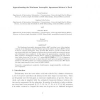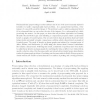88 search results - page 6 / 18 » Reducing hard SAT instances to polynomial ones |
AI
1999
Springer
13 years 7 months ago
1999
Springer
Stochastic local search (SLS) algorithms have been successfully applied to hard combinatorial problems from different domains. Due to their inherent randomness, the run-time behav...
AAAI
2000
13 years 8 months ago
2000
The random k-SAT model is extensively used to compare satisfiability algorithms or to find the best settings for the parameters of some algorithm. Conclusions are derived from the...
CPM
2000
Springer
13 years 11 months ago
2000
Springer
The Maximum Isomorphic Agreement Subtree (MIT) problem is one of the simplest versions of the Maximum Interval Weight Agreement Subtree method (MIWT) which is used to compare phyl...
CP
2010
Springer
13 years 6 months ago
2010
Springer
We present a new complete multi-valued SAT solver, based on current state-of-the-art SAT technology. It features watched literal propagation and conflict driven clause learning. W...
FOCS
2009
IEEE
14 years 2 months ago
2009
IEEE
Polynomial time preprocessing to reduce instance size is one of the most commonly deployed heuristics to tackle computationally hard problems. In a parameterized problem, every in...



